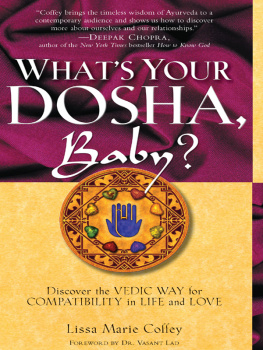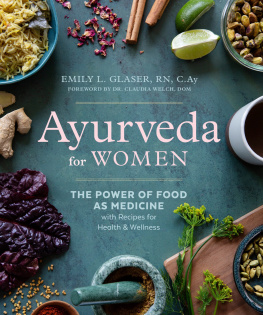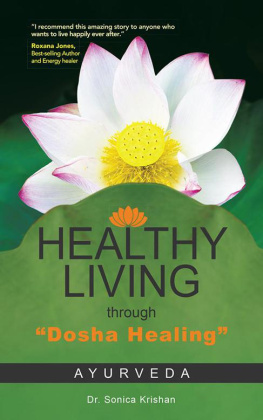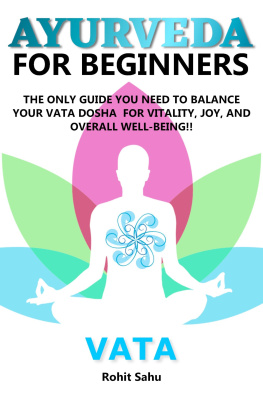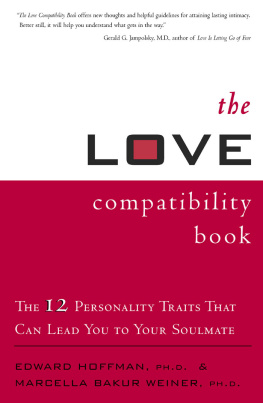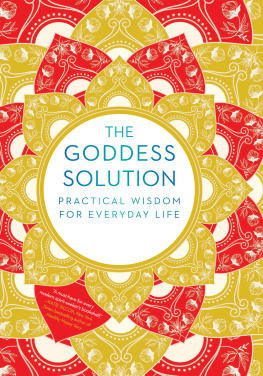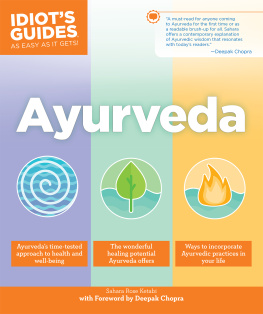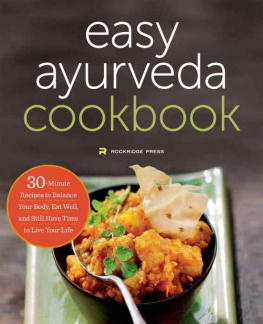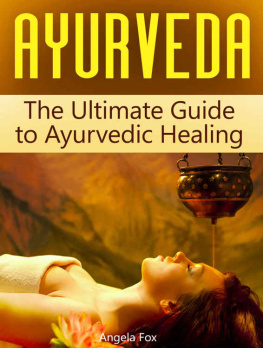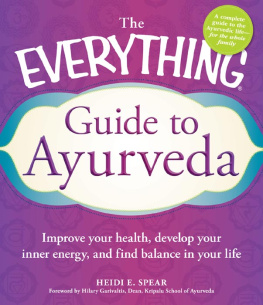All rights reserved. No part of this book may be reproduced in whole or in part without written permission from the publisher, except by reviewers who may quote brief excerpts in connection with a review in a newspaper, magazine, or electronic publication; nor may any part of this book be reproduced, stored in a retrieval system, or transmitted in any form or by any means electronic, mechanical, photocopying, recording, or other, without written permission from the publisher.
Library of Congress Cataloging-in-Publication Data is available.
FOREWORD
A YURVEDA TEACHES THAT human life consists of relationships. Whether it is the relationship between an individual and the environment, between a man and a woman, between two friends, or between body, mind, and consciousness, the ancient wisdom of Ayurveda shows us how to live life in harmony.
In order to have healthy relationships, we must first understand ourselves and how we work. We can get a great deal of insight by looking at the balance of our doshas (Vata, Pitta, and Kapha), also called our prakruti, which is like a fingerprint because its unique to each one of us. The ways in which Vata, Pitta, and Kapha express themselves in our bodies and minds defines our individualityour specific sensitivities, likes and dislikes, and temperaments. We can use our doshas as a mirror to help us look at ourselves and see what is, or what we actually are: living, dynamic beings subject to change. That is reality. Many of us spend our time looking at what should be or would be or could be, which is all an illusion. Reality demands awareness, and in that awareness you will find compassion, love, and freedom. Awareness allows you to experience who you really are and to blossom.
Before you jump into the river of relationships, you must be absolutely clear about your mental status. You must ask yourself whether it is loneliness, fear, or anxiety that is making you fall into a particular relationship or clarity, compassion, and love. It is absolutely true that like attracts like. When two lonely individuals are attracted to each other, they fall into a relationship and mechanically repeat, I love you, I love you. But when their loneliness disappears, the relationship falls apart. So you need to be very aware of how you feel before entering into a relationship. A healthy relationship consists of clarity, compassion, understanding, and love for one another. A relationship like this is valuable and healing for both partners. It allows us to experience intimacy and unity because it is free from fear.
In April 2003 the Ayurvedic Institute was offering a wonderful seminar on relationships and it was there that I met Lissa Marie Coffey. She personally handed me the manuscript of her book Whats Your Dosha, Baby? I read it and it deeply touched my heart. In this charming, loving book, Lisa brings Ayurvedic principles to a practical level in our lives. She shows how we can use our relationships as a mirror to watch ourselves and learn about ourselves. Relationships are the school of our daily lives, where we learn a great deal about our natures. This book will go a long way toward helping you better understand yourself in your daily relationships and will definitely inspire happiness and healing in our togetherness.
Love and light,
Vasant Lad, MASc
The Ayurvedic Institute
Albuquerque, NM
INTRODUCTION
A SK ANYONE AND youll get the same answer:Whats the most important thing in life? Love! We want to be in love, and we want that love to last. So how do we go about finding that one person to share our lives with? And how do we live happily ever after with that person, once we find him or her?
There are many ways of looking at our compatibility with other peoplesuch as the Mars/Venus theories and the Love Signs system based on astrology, among others. But long before any of these formulas were even a twinkle in the cosmos, philosophers and scientists in ancient India devised a system of health care called Ayurveda, or the science of life. Within this holistic system lies everything we need to know about love.
Ayurveda explains the nature of everything in the universe. It is a compelling way of looking at all of life: its physical, emotional, mental, and spiritual aspects. Ayurveda types people according to their physical features and personality traits. Ayurveda tells us how we tick, and how we relate to the rest of the world, including the other people in it!
Once we understand the basics of Ayurveda, we see that we can get along with anyone. There are no bad matches! So, whether you want to end the squabbling with your mate, youre having a hard time with your boss, or your boyfriend just wont commit, with this system of ancient Indian love matches, youll find ways to make the relationship work.
It is impossible to go through this life alone. We all have relationships, people in our lives we interact with. The purpose of those relationships is to help us learn and grow. And more than that, the purpose of any relationship is to help us learn more about ourselves and who we really are.
When we understand who we are, and why we are here, everything seems to fall into place. Were happier and more content, and we feel our connection to the universe. We attract like-minded people into our lives and our relationships become stronger.
According to Ayurvedic wisdom, there are four basic principles of life; these are discussed in the Upanishads, the sacred texts upon which Hinduism is built. These principles form the foundation of Ayurveda and can be used to help us understand the role our relationships play in our lives.
There is an organizing power in the universe. The universe is intelligent and creates harmony. There are no accidents or coincidences. Nothing is random. Everything happens for a reason.

